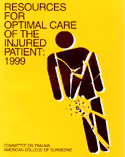Friday, March 03, 2006
Trauma Center Confusion.....
Some comments from this post bring up a point I neglected to make:
Designation of trauma centers is handled by the state or some other governing body. The requirements they use vary but are probably close the ACS's "Resources for Optimal Care of the Injured Patient", or as it is more widely known "the Gold Book":

The State of Georgia uses the "Gold Book" as its' measuring stick for trauma centers. Grady, MCCG (Macon), MCG (Augusta), and Memorial (Savannah) are all state designated trauma centers in Georgia. Shock-Trauma at UM is designated by the State of Maryland as is Harborview by the State of Washington.
On the patient care side of the equation I have little doubt that these three centers could easily pass ACS muster. But since a good deal of the review has to do with "systems" issues, I cannot give a sweeping statement about if they could become verified.
Verification, OTOH, is a voluntary process that a trauma center may undergo at which time it is inspected by members of the Consultation/Verification committee chosen by the ACS. The review involves a site visit and a chart review. Such a review may be more intense than one put on by the state. Why are such noted trauma centers as those listed above not verified? Verification is an expensive process. A verification visit costs $9000, a fee that does not include hotel and travel expenses of the reviewers. A re-designation is $8000, plus expenses, and re-designation occurs every three years. Some states which generously support their trauma centers tie in that funding to verification. This is probably why Ohio has 31 trauma centers of various levels. So it has to be financially worthwhile to undergo the process.
What about the prestige of being an ACS verified trauma center? The big dogs are probably secure enough with their reputations that they may regard verification as superfluous. As far as patient flow, in many places the trauma patients are going to flow to the same hospital, whether it is a trauma center or not. So verification may not produce many benefits.
As trauma systems nationwide become more evolved the requirement of ACS verification may be tied into funding. This would most certainly result in higher levels of ACS verification. |
Some comments from this post bring up a point I neglected to make:
I notice there aren't any ACS certified trauma centers in Maryland, either. Does UMM's R Adams Cowley Shock Trauma Center not conform to ACS's standards?and
I'm a bit perplexed myself, this list is obviously devoid of some major trauma centers (Emory in Atlanta, Harborview in Seattle, Shock Trauma in Baltimore). All three of these states (GA,WA,MD) are listed as being without level one trauma centers, yet these three are all superb trauma hospitals. The ACS list therefore might not be the most useful for making these observations... That being said, very interesting data, although not too surprising.First off let me explain the difference between designation and verification.
Designation of trauma centers is handled by the state or some other governing body. The requirements they use vary but are probably close the ACS's "Resources for Optimal Care of the Injured Patient", or as it is more widely known "the Gold Book":

The State of Georgia uses the "Gold Book" as its' measuring stick for trauma centers. Grady, MCCG (Macon), MCG (Augusta), and Memorial (Savannah) are all state designated trauma centers in Georgia. Shock-Trauma at UM is designated by the State of Maryland as is Harborview by the State of Washington.
On the patient care side of the equation I have little doubt that these three centers could easily pass ACS muster. But since a good deal of the review has to do with "systems" issues, I cannot give a sweeping statement about if they could become verified.
Verification, OTOH, is a voluntary process that a trauma center may undergo at which time it is inspected by members of the Consultation/Verification committee chosen by the ACS. The review involves a site visit and a chart review. Such a review may be more intense than one put on by the state. Why are such noted trauma centers as those listed above not verified? Verification is an expensive process. A verification visit costs $9000, a fee that does not include hotel and travel expenses of the reviewers. A re-designation is $8000, plus expenses, and re-designation occurs every three years. Some states which generously support their trauma centers tie in that funding to verification. This is probably why Ohio has 31 trauma centers of various levels. So it has to be financially worthwhile to undergo the process.
What about the prestige of being an ACS verified trauma center? The big dogs are probably secure enough with their reputations that they may regard verification as superfluous. As far as patient flow, in many places the trauma patients are going to flow to the same hospital, whether it is a trauma center or not. So verification may not produce many benefits.
As trauma systems nationwide become more evolved the requirement of ACS verification may be tied into funding. This would most certainly result in higher levels of ACS verification. |






